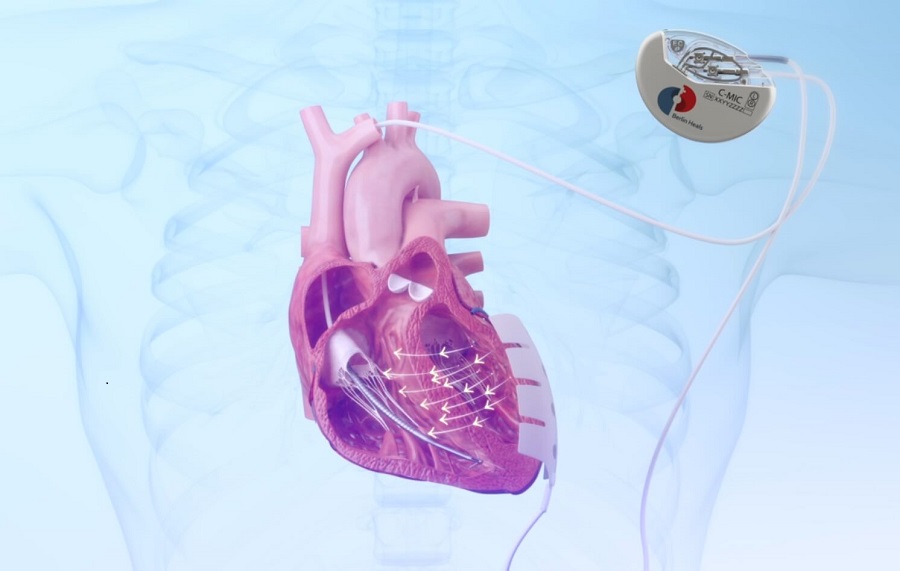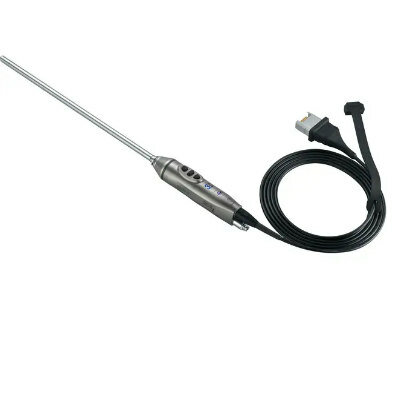Novel Cardiac Implant Provides Life-Saving Treatment for Heart Failure Patients
|
By HospiMedica International staff writers Posted on 19 Jun 2024 |

Heart failure caused by cardiomyopathy is a chronic inflammatory condition where the heart muscle fails to pump sufficient blood to meet the body’s demand for blood and oxygen. It is a progressive disease that becomes increasingly difficult to manage over time. To date, no medical device, drug, or therapy has been able to reverse heart failure, allowing patients to maintain a normal and active lifestyle. Now, a novel cardiac implant aims to provide a breakthrough treatment for patients with heart failure.
The C-MIC (Cardiac Microcurrent Therapy Device) is a small, implantable device developed by Berlin Heals (Zug, Switzerland) that represents a groundbreaking, life-saving treatment option for heart failure. The device utilizes electrical microcurrents to remove excess edema from heart cells through electroosmosis while simultaneously encouraging a transition from reverse remodeling to actual myocardial recovery. It achieves reverse remodeling of cardiac muscle tissue by delivering a constant, low-level direct current (DC), mimicking physiological microcurrents, through two leads/electrodes—one attached to the epicardium of the left ventricle and the other inside the right ventricular cavity. This continuous electrical microcurrent not only reduces inflammation in the heart tissue but also helps expel excess fluid from the heart.
This patented technology is easy to implant and has demonstrated significant clinical improvements in heart failure patients. In a randomized study, 35 C-MIC devices have been successfully implanted, with patients showing rapid enhancements in heart function, heart size, and overall quality of life shortly after receiving the C-MIC. Remarkably, patients' average walking distance in six minutes nearly doubled after four weeks, and their typically enlarged hearts due to dilated cardiomyopathies decreased in size. The electrical microcurrent was imperceptible to the patients and did not affect their heart rhythm. No specific side medication or additional procedures were necessary post-implantation, and the improvements were sustained and even increased over a six-month period. Berlin Heals anticipates CE certification by the end of 2025 or early 2026. Due to its significant benefits for patients, the U.S. Food and Drug Administration (FDA) is particularly supportive of the approval process for the C-MIC implant in the USA.
"We are convinced that we have developed a product for the treatment of severe heart failure that will restore quality of life to many patients worldwide and significantly extend their life expectancy,” said Marko Bagaric, Chief Executive Officer of Berlin Heals Holding AG. “I am convinced that C-MIC will set a new standard in the treatment of these patients in the future. After a short operation, an imperceptible, constant microcurrent flows, which ensures that patients feel very well again within a few weeks."
Related Links:
Berlin Heals
Latest Critical Care News
- Novel Cannula Delivery System Enables Targeted Delivery of Imaging Agents and Drugs
- Ingestible Smart Capsule for Chemical Sensing in the Gut Moves Closer to Market
- Novel Intrabronchial Method Delivers Cell Therapies in Critically Ill Patients on External Lung Support
- Generative AI Technology Detects Heart Disease Earlier Than Conventional Methods
- Wearable Technology Predicts Cardiovascular Risk by Continuously Monitoring Heart Rate Recovery
- Wearable Health Monitoring Device Measures Gases Emitted from and Absorbed by Skin
- Groundbreaking Technology Rapidly Detects Airborne Influenza Viruses
- Handheld Device Could Transform Heart Disease Screening
- Flexible Semi-Autonomous Robot Could Deliver Medicine Inside Body

- Neurorestorative Treatment Strategies Hold Promise for Most Severe Forms of Epilepsy
- Gene Discovery Could Help Grow New Heart Arteries
- Study Discovers Invisible Transmission of Common Hospital-Associated Infection
- Non-Invasive Neuro-Ophthalmology Techniques Could Detect Brain Tumors Earlier
- Mass Manufactured Nanoparticles to Deliver Cancer Drugs Directly to Tumors
- World’s Smallest Pacemaker Fits Inside Syringe Tip

- AI-Powered, Internet-Connected Medical Devices to Revolutionize Healthcare, Finds Study
Channels
Surgical Techniques
view channel
Intravascular Imaging for Guiding Stent Implantation Ensures Safer Stenting Procedures
Patients diagnosed with coronary artery disease, which is caused by plaque accumulation within the arteries leading to chest pain, shortness of breath, and potential heart attacks, frequently undergo percutaneous... Read more
World's First AI Surgical Guidance Platform Allows Surgeons to Measure Success in Real-Time
Surgeons have always faced challenges in measuring their progress toward surgical goals during procedures. Traditionally, obtaining measurements required stepping out of the sterile environment to perform... Read morePatient Care
view channel
Portable Biosensor Platform to Reduce Hospital-Acquired Infections
Approximately 4 million patients in the European Union acquire healthcare-associated infections (HAIs) or nosocomial infections each year, with around 37,000 deaths directly resulting from these infections,... Read moreFirst-Of-Its-Kind Portable Germicidal Light Technology Disinfects High-Touch Clinical Surfaces in Seconds
Reducing healthcare-acquired infections (HAIs) remains a pressing issue within global healthcare systems. In the United States alone, 1.7 million patients contract HAIs annually, leading to approximately... Read more
Surgical Capacity Optimization Solution Helps Hospitals Boost OR Utilization
An innovative solution has the capability to transform surgical capacity utilization by targeting the root cause of surgical block time inefficiencies. Fujitsu Limited’s (Tokyo, Japan) Surgical Capacity... Read more
Game-Changing Innovation in Surgical Instrument Sterilization Significantly Improves OR Throughput
A groundbreaking innovation enables hospitals to significantly improve instrument processing time and throughput in operating rooms (ORs) and sterile processing departments. Turbett Surgical, Inc.... Read moreHealth IT
view channel
Printable Molecule-Selective Nanoparticles Enable Mass Production of Wearable Biosensors
The future of medicine is likely to focus on the personalization of healthcare—understanding exactly what an individual requires and delivering the appropriate combination of nutrients, metabolites, and... Read more
Smartwatches Could Detect Congestive Heart Failure
Diagnosing congestive heart failure (CHF) typically requires expensive and time-consuming imaging techniques like echocardiography, also known as cardiac ultrasound. Previously, detecting CHF by analyzing... Read moreBusiness
view channel
Expanded Collaboration to Transform OR Technology Through AI and Automation
The expansion of an existing collaboration between three leading companies aims to develop artificial intelligence (AI)-driven solutions for smart operating rooms with sophisticated monitoring and automation.... Read more

















